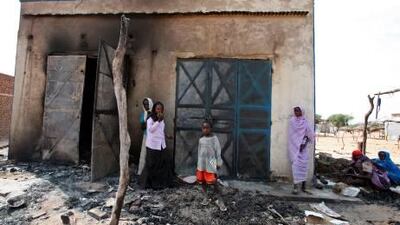NEW YORK // Officials for the world's permanent war-crimes tribunal say their meeting with Arab officials and jurists scheduled for this week in Qatar is merely an "awareness-raising exercise". But for those campaigning for Arab governments to join the International Criminal Court (ICC), the gathering is a sign that the region's political leaders are starting to take the court and international criminal tribunals more seriously.
Since it was established in 2002, the ICC has prosecuted perpetrators of some of the world's worst atrocities. It has been criticised, however, for having a western bias and targeting African offenders - including a controversial case against Sudan's president, Omar al Bashir. Only three members of the 22-nation Arab League - Jordan, the Comoros and Djibouti - have ratified the ICC's founding treaty, the Rome Statute. The Arab Middle East has a lower proportion of members than any other region of the world.
ICC officials insist the court does not target African leaders, saying it can only prosecute citizens of ICC members, or after referral by the UN Security Council, when domestic courts are unwilling or unable to launch cases. The court's prosecutor, Luis Moreno-Ocampo, has collected evidence of crimes committed during Israel's assault on Gaza, but he lacks jurisdiction in the territory. Critics say the court is weak because it cannot probe crimes in non-members such as Israel, the United States, China and Russia.
Arab leaders have expressed reluctance to join the ICC because it threatens the immunity enjoyed by heads of state. They also see a double standard, by which the court has targeted Mr al Bashir, the leader of an Arab League member, but will not prosecute Israeli suspects over alleged war crimes in the Gaza Strip. Abeer al Khraisha, the Amman-based coordinator for the Coalition for the International Criminal Court (CICC), which advocates for the body, said Arab officials "point to these double standards … and question its credibility."
Arab League officials describe the two-day meeting, which starts tomorrow in Doha, as an opportunity to debate how the court operates rather than to encourage governments to join the ICC, which has 113 members. "This is not a meeting where we will take positions. This is a meeting where we will have a discussion, and raise awareness on the role of the ICC, their activities and so on," said Hesham Youssef, a senior aide to the Arab League's secretary general, Amr Moussa.
The ICC official who termed the Doha meeting an "awareness-raising exercise" said "relations are zero" between the Arab League and the court. Speaking on condition of anonymity, she said court officials will not discuss the upcoming conference because talks with potential Arab members are "sensitive". During a visit to Doha last month, Silvana Arbia, the court's registrar, said the region suffered from "misinformation about the mandate and functioning of the ICC". She told Arab politicians the court guarantees fair trials and applies justice "equally across the board".
The idea of a permanent international criminal court stems from the aftermath of the Second World War, when victorious allied powers put the leaders of defeated Germany and Japan on trial for wartime atrocities. It received a boost with the creation of UN-backed special tribunals for the former Yugoslavia, Rwanda, Sierra Leone, Cambodia, East Timor and Lebanon. Based in The Hague, the ICC has accused military chiefs and government officials of orchestrating mass rape, recruiting child soldiers and other atrocities in Democratic Republic of Congo, Central African Republic, Uganda and the Sudanese province of Darfur.
Judges have approved two arrest warrants for Mr al Bashir on 10 counts of war crimes, crimes against humanity and genocide alleged to have been committed against Darfuri ethnic groups from 2003 to 2004. African and Arab leaders have been scathing in their criticism of the prosecution of Mr al Bashir, the first such move against a sitting head of state. Officials from Kenya, which signed the Rome Statute in 1999, refused to arrest Mr al Bashir when he visited Nairobi in August.
The CICC, comprising campaigners from 150 countries, monitors support for the court and notes growing interest among Arab nations - particularly those in the Gulf. It highlights the speakers scheduled for this week's meeting - including Qatar's first lady, Sheikha Moza Sheikha Moza al Misned, and Jordan's ambassador to the US, Prince Zeid Ra'ad Zeid al Hussein - as indicative of top-level support.
It also points to high-level delegations from Kuwait and the UAE to the Rome Statute review meeting in Uganda in June, where Dr Hadef Juan al Dhaheri, the UAE justice minister, led an entourage of judges, attorneys general and diplomats. "This is the first meeting of its kind in an underrepresented region. There are some states in the Arab world where these kinds of discussions have never taken place and there has been no political will to join the court," said Ata Hindi, the CICC's Middle East expert.
the times
November 20, 1945 The Nuremberg trials, established by victorious allies to prosecute top leaders of Nazi Germany after the Second World War, begin. They initiate the movement for the creation of a permanent international criminal court.
July 1, 2002 The ICC is established - the same day its founding treaty, the Rome Statute, enters into force.
January 26, 2009 The ICC's first trial, of Congolese militia leader Thomas Lubanga, begins.
2010 Of the 113 countries that have ratified the Rome Statute as of today, only three members of the Arab League – Jordan, Djibouti and the Comoros – are members of the international criminal court.


